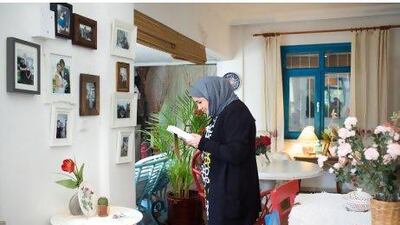ISTANBUL // To the casual observer, Gul Mutfagi might be just a cute little restaurant in an otherwise non-descript neighbourhood close to a motorway in the Asian part of Istanbul. But for Lamya'a, it is a dream come true.
"I could feel my heart beating so hard when I entered," Lamya'a, who is from Kuwait and gave only her first name, said on a recent sunny day as she went around the modest one-room restaurant taking pictures of the tables, the open kitchen and other items as if she were in a museum.
Smiling happily, she examined every little detail of the restaurant, including the pictures on the walls intently. This was the highlight of her five-day visit to Istanbul.
"I remember everything, this is fantastic," she said.
Lamya'a and the five female relatives accompanying her were not drawn here by the menu of Turkish and international food. They and other Arab tourists love Gul Mutfagi because a popular Turkish soap opera, What is Fatmagul's crime?, was filmed here.
Turkish soaps have emerged as a booster for Turkey's image in the Middle East, as well as a tourist attraction and source of revenue. "Sometimes we have 250 visitors here in one day, whole busloads," said Cuneyt Sahin, who owns and runs Gul Mutfagi, or Rose Kitchen, with his wife Seval and his son Berke.
Fatmagul, which tells the story of a young girl who is gang-raped, forced to remain silent about the crime and to marry one of her rapists, is just one of several Turkish soaps that have become major hits in Arab countries in recent years.
Others are Magnificent Century, which deals with palace intrigues at the court of a 16th-century Ottoman sultan, the family saga Forbidden Love, and Silver, the story of a young woman marrying into a wealthy family that is broadcast as Noor in Arab countries. Lamya'a and her relatives said they knew all of them.
Alpay Gurbuz, of the Association of Turkish Travel Agencies (Tursab) in Istanbul, said the soaps were one reason for the increase in Arab tourists. "They certainly had an effect," he said.
The number of Kuwaiti tourists almost tripled between 2010 and 2012, from roughly 27,000 to about 65,000, according to Tursab. The number of visitors from the UAE rose from 30,000 to 48,000 in the same period, while the number of Saudi tourists doubled from 85,000 to 175,000.
Besides Gul Mutfagi, another attraction is a villa on the Bosphorus that was used as a backdrop in Noor, although soap-opera tourists are also drawn to many of the city's landmarks that appear in the series.
"The TV series influenced Turkey's image abroad and even created their own market," Mr Gurbuz said.
Adem Gurses, head of the private channel ATV, which has produced several soaps, told the Sabah newspaper last month that the export of Turkish television series was generating revenue of more than US$100 million (Dh367m) a year.
Fatmagul has become so famous in Arab countries that Mr Sahin said he had received offers from businessmen there to build replicas of his restaurant in the Middle East. He said he was still thinking the offers over.
"This is a famous place now, like Sultanahmet or the Hagia Sophia," said Mashail, one of Lamya'a's relatives, referring to the Sultanahmet Mosque and the former mosque and Byzantine basilica Hagia Sophia, two world-famous Istanbul landmarks. Like Lamya'a, Mashail only gave her first name.
"It has been very popular," Mashail said of Fatmagul, the final episode of which was aired in Kuwait about a month ago.
"We like the stories, the atmosphere, the lifestyle" of Turkish series, she said, adding that they had replaced Syrian shows as audience favourites in Kuwait.
Mr Sahin said Turkish TV soaps were popular because viewers in Arab countries could relate to the things they saw on the screen.
"In Turkey, women are suppressed, and in Arab countries, women are suppressed," he said. "We have the same values and the same problems."
When Mr Sahin opened his restaurant four years ago, he had Mediterranean food with a matching ambience in mind. But then it was spotted by location scouts for the company producing Fatmagul. Much of the action in the soap takes place in a restaurant run by Fatmagul, played by the actress Beren Saat.
"People want to sit where Kerim sat," he said, referring to the soap's male lead, played by Engin Akyurek. "I cannot change a single thing, because people would notice. Visitors pose with this teapot here, because it was in the series."
Every now and then, visitors pick fruit from the trees in the little garden in front of the restaurant.
Some fans go even further. Zekeriya Kul, a plastic surgeon in Istanbul, said an increasing number of his female clients from Arab countries wanted to look like Ms Saat or other Turkish actresses.
Dr Kul, who also performs surgeries in Dubai, said the trend started last year. Arab women told him they liked the "Beren Saat eyebrow and the Tuba Buyukustun nose," he said. Ms Buyukustun is the star of Asi, another hit Turkish soap in Arab countries.
Dr Kul said the phenomenon of the "Turkish actress look" was part of a general trend towards a more natural appearance, and replaced the "Lebanese singer look" that involved fuller lips, more defined cheekbones and very small noses.
Dr Kul had no doubt that Turkish soap operas played a part in the change. As Turkish films and series became hits in the Arab world, everyone chose "one actress as a model", he said.
tseibert@thenational.ae
twitter: For breaking news from the Gulf, the Middle East and around the globe follow The National World. Follow us

